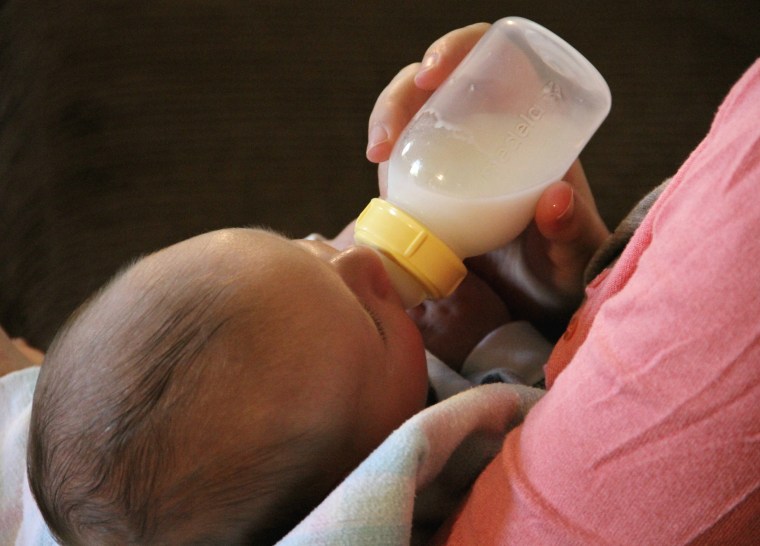What and how parents choose to feed infants — from breast to bottle and beyond — could have an enduring impact on the child’s health and waistline, new research suggests.
A series of studies published Tuesday as a special supplement to Pediatrics finds that infant diets can have a discernable impact on children’s health at least up to age 6 — and the implication is that this will continue as they grow older.

The new research underscores the importance of breast-feeding as a predictor of better health as children grow up. For example, CDC researchers found that the longer a mother breast-fed, the lower the odds her child would end up with ear, throat and sinus infections. The reduced risk of infection was seen in children who were exclusively breast-fed for at least six months as well as in those who were breast-fed at least part-time for nine months.
“The overall finding is that some of the health benefits go beyond infancy,” said Kelley Scanlon, co-author on several of the studies and lead epidemiologist in the division of nutrition, physical activity and obesity at the Centers for Disease Control and Prevention.
Breast-feeding in infancy also increased the likelihood that children would be consuming a healthy diet later on. At age 6, children who were breast-fed drank sugary beverages less often and consumed water, fruits and vegetables more often than those who were bottle-fed, CDC researchers found.
That all makes sense, Scanlon said. “We know from other studies that children’s eating behaviors and preferences develop very early and are influenced by a variety of factors,” she explained. “They seem to have an innate preference for sweet and salty foods and dislike bitter flavors, which are found in vegetables.”
That can be changed when children are exposed to in utero and through breast milk to the flavors found in vegetables, Scanlon said. “Breast-fed infants are more open to different flavors,” she added.
Parents can increase the likelihood that their child will make healthy choices if they start offering fruits and vegetables during late infancy. Researchers found that when children ate fruits and vegetables infrequently during infancy, they continued to eat them infrequently at age 6.
A study that focused on bottle-fed infants highlighted a more subtle advantage to breast-feeding: Moms who bottle-feed may be more apt to push their babies to consume more food than they need. In that study, researchers found that moms who encouraged infants to finish their bottles were more likely to also encourage 6-year-olds to finish everything on their plates.
The explanation: Moms who breast-feed are less likely to push their infants to continue to drink once babies indicate they’ve had enough, said Dr. Karen Marie Puopolo, an expert unaffiliated with the new study and section chief of neonatology at Pennsylvania Hospital.
“When a child is at the breast there is a natural level of self-regulation,” Puopolo said. “It’s very difficult to overfeed. But when you can see that there is milk left in the bottle it’s hard to get beyond that thought, ‘Oh dear, he didn’t finish.’”
One finding that surprised the researchers themselves was that parents were still giving infants sugary drinks. “It was surprising to find that 27 percent of infants had been fed sugar-sweetened beverages at some point during their infancy,” said Dr. Liping Pan, lead author of a study on sugar-sweetened beverages and an epidemiologist in the obesity prevention branch of the CDC. “And almost 9 percent had given sugar-sweetened beverages before their infants were 6 months old.”
Pan and her colleagues found that children who consumed sugary beverages three or more times a week at 10 to 12 months of age had twice the risk of obesity as 6-year-olds compared to those who drank no sugar-sweetened beverages in infancy.
Puopolo suspects that part of the problem may be that parents haven’t fully digested the idea that fruit juices are simply “candy water.”
Fruit, on the other hand, with the fiber it contains is a very healthy addition to the diets of both infants and growing children, Puopolo said.
The new reports all used information collected on infants born between May of 2005 and March of 2006 for the Infant Feeding Practices Study II. For that study, moms were interviewed monthly starting in the last trimester of pregnancy and through the first year of the infants’ lives.
Six years later, the moms were contacted once again and re-interviewed for the new studies.
Taken as a whole, the new studies underscore the importance of early nutrition.
“Each of these reports is looking at something different,” Puopolo said. “However, the common theme is that early exposure can have an enduring impact on child health.”
Linda Carroll is a regular contributor to NBCNews.com and TODAY.com. She is co-author of "The Concussion Crisis: Anatomy of a Silent Epidemic” and the recently released “Duel for the Crown: Affirmed, Alydar, and Racing’s Greatest Rivalry”